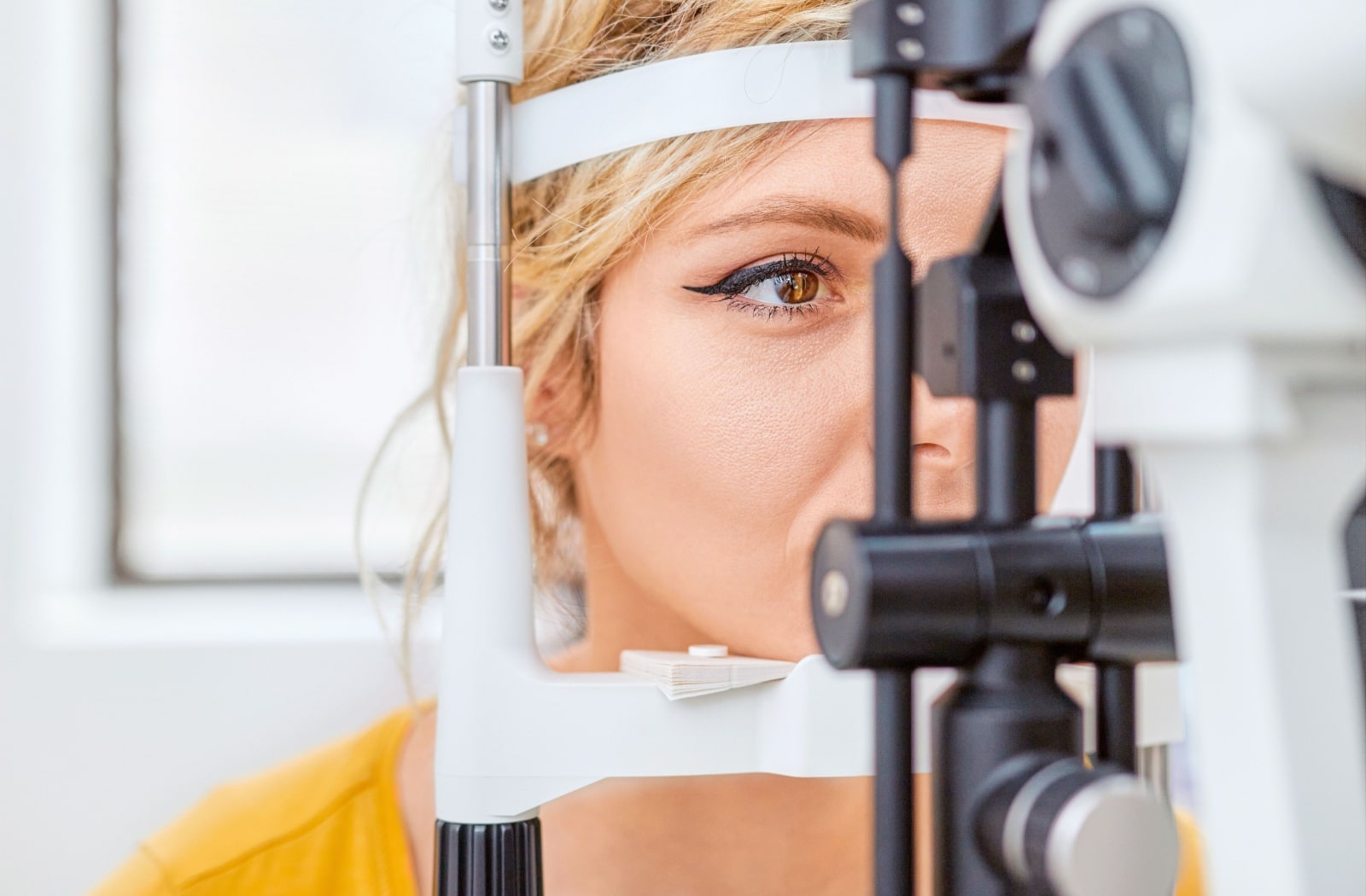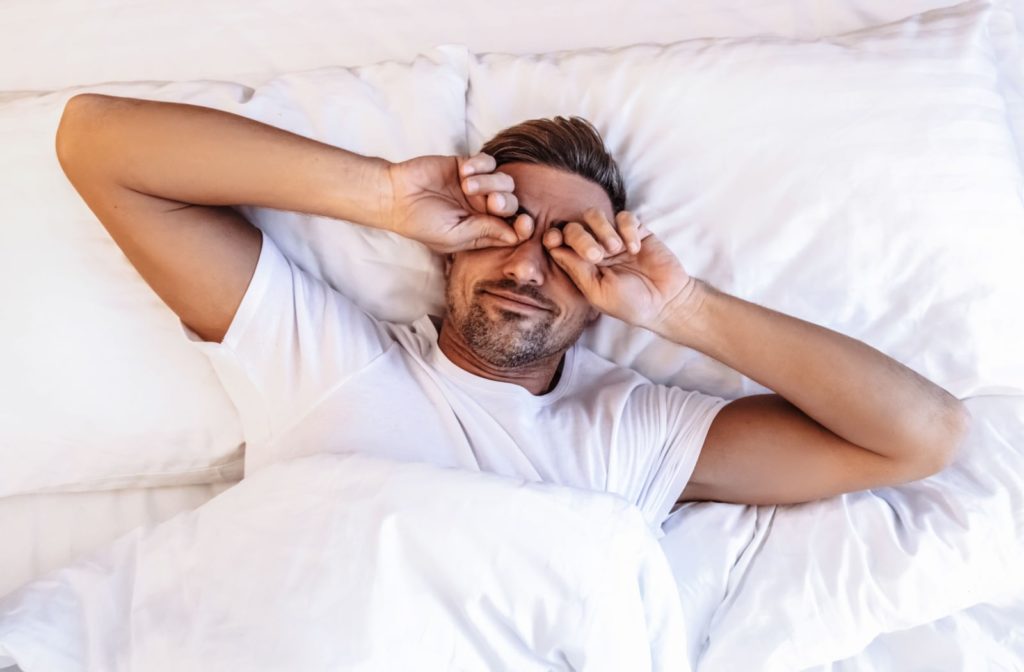You want to start the day putting your best foot forward, but waking up with dry eyes can dampen your mood. While everyone’s eyes can feel dry occasionally, experiencing them when you wake up can mean there’s a problem. Typically, there are 2 general causes when this happens to you—nocturnal lagophthalmos or dry eye disease.
Learning more about why your eyes feel dry in the morning can better equip you before your next appointment with your optometrist.
Waking Up With Dry Eyes
Dry eyes in the morning are a common experience for many patients. Your eye doctor can help determine the cause of your dry eyes during an eye exam. The common causes of this irritation are either nocturnal lagophthalmos or dry eye disease.
Nocturnal Lagophthalmos
Nocturnal lagophthalmos is a condition where your eyelids don’t fully close when you sleep, causing dry eyes in the morning. A weakness in your facial nerve can cause this condition. This weakness develops due to injury to the skull or jaw or Bell’s palsy.
Dry Eye Disease
Dry eyes occur when your tears cannot effectively hydrate your eyes, leading to dry, irritated eyes. It’s a common condition that many Canadians live with.
The symptoms of dry eyes include:
- Gritty eyes
- Blurry vision
- Eyes that feel like they sting or burn
- Light sensitivity
- Red eyes
While dry eyes are treatable, your eye doctor must first diagnose the cause of your symptoms.
What Causes Dry Eye?
Many factors can influence dry eye development, including age and environment, but the overall cause of dry eyes is issues with your tear film.
Your tear film consists of 3 layers (oil, water, and mucus) that work together to help keep your eyes moist and protected. The mucus layer helps keep tears on your eye, the water layer helps hydrate and protect the eye, and the oil layer helps prevent your tears from evaporating.
When the tear film experiences issues, it can lead to decreased tear production or increased tear evaporation.
Decreased Tear Production
Decreased tear production occurs when your eyes don’t create enough tears. This commonly occurs due to age—patients tend to produce fewer tears with time. However, medical conditions and medications like antidepressants and antihistamines can affect tear production as well.
Increased Tear Evaporation – Evaporative Dry Eye
Increased tear evaporation occurs when there isn’t enough oil in the tear film to protect your tears from evaporating too quickly. Several factors can influence tear evaporation, but one of the most common is evaporative dry eye.
Evaporative dry eye is a condition where your eyes don’t have enough oil in their tears. This oil layer helps prevent tears from evaporating too quickly. When this happens, your tear film lacks enough oil, and tears evaporate faster, causing dry eyes which increase with age.
Environmental Factors
While the common causes of dry eye are decreased tear production and increased tear evaporation, environmental factors can be a common risk.
Dry air and wind can increase tear evaporation and lead to dry eyes. Additionally, exposure to smoke can cause dry eye symptoms. Protect your eyes when you’re outside with wraparound sunglasses.
Your environment can include computer habits as well. Using digital devices for long periods can lead to dry, irritated eyes. Make sure you take breaks during the day to avoid unnecessary discomfort.
How Can You Treat Dry Eye?
Dry eyes can be uncomfortable, irritating, and affect your vision. Fortunately, there are ways to treat this condition—from eye drops to diet. Your eye doctor can recommend the best treatments for your needs after determining the root cause of your symptoms.
Your optometrist has many ways to treat dry eyes, including:
- Eye drops: Over-the-counter eye drops can help provide temporary moisture to your eyes, but your eye doctor can recommend more specialized eye drops. These advanced eye drops can help relieve mild to severe dry eye symptoms. If needed, your optometrist can prescribe medicated eye drops as well.
- Meibomian gland expression: Meibomian gland expression involves gently expressing the meibomian glands to help improve oil flow to the tear film. Your eye doctor will warm these glands before placing pressure to help unblock them and reduce dry eye symptoms.
- Warm compresses: Warm compresses can help relieve pain, reduce swelling, and warm the meibomian glands with heat. You can make a warm compress at home or speak with your optometrist about more intensive treatment options.
- Eye nutrition: Many doctors preach the benefits of a healthy diet. What you eat can benefit your eyes and even help reduce dry eye symptoms. Eat omega-3 fatty acid-rich foods or ask your eye doctor about supplements that can help improve oil production and reduce inflammation.

Don’t Settle for Dry Eyes
Dry eyes are common for many patients, but this condition is manageable with help from your optometrist. Don’t start your mornings with dry eyes—visit your eye doctor to determine the cause of your symptoms and potential treatments. Contact Headwaters Optometry if you experience dry eye symptoms.




